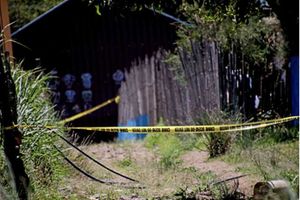US travel advisories cost Kenya Sh3b

Children from Nashiongo Village in Bunyala North, Busia District, join hands to repair a dyke to prevent flooding near their homes after River Nzoia burst its banks after a downpour.
Kenya continues to lose a substantial amount of foreign exchange following travel warnings issued by the US government. So far, the country has lost about Sh3 billion [about $38 million].
Hopes that the warnings would be lifted were dashed following last week's extension of the warning despite spirited campaigns by the government to beef up security at the country's airports.
Once the country's leading foreign exchange earner, the tourism industry has been relegated to the fourth position after tea, horticulture and coffee due to rising insecurity and international terrorism threats.
The new ban totally ignores appeals by the Kenya Tourism Foundation (KTF) to the US government to consider lifting the ban. KTF sees it as a mockery of the efforts the Kenya government has been making to improve security.
The immediate former KTF Chairman, Mr Jake Grieves-Cook, told the Sunday Nation the loss has serious implications on the country's conservation. "The US tourists are almost entirely safari tourists.
Most of them spend more than six nights each in a National Park or Reserve during their visit to Kenya. Therefore the country is essentially losing Sh3 billion as a result of these warnings," he said.
US insurance companies have denied cover to US nationals travelling to Kenya, further discouraging them from travelling. Mr Grieves-Cook urges the US government to follow the British and issue travel advisories which encourage travelling.
He says that although the US government has a responsibility over the safety of its citizens, it should review its security policy so that such warnings are limited only to places with military operations, revolutions, war or rebellions against the state, of which Kenya is not.
Ironically, the ban came at a time when Kenya was hosting an international horticultural exhibition (Hortec) in Nairobi that ended successfully. The warning came in the wake of the lifting of a similar one by Australia, with the US government extending its warning up to September, claiming that East Africa was still home to supporters of Al Qaida and other extremists.
The Kenya Tourist Federation has officially written to the US Bureau of Consular Affairs in Washington to protest at the continued warnings, while Security Minister Dr Chris Murungaru says that the government is negotiating to have the warnings revised "soon''.
In a letter addressed to the Deputy Assistant Secretary of the Bureau, Ms Diane Andruch, last month, KTF said the warnings are unnecessary. He points out the huge losses the country's tourism sector has incurred since the warnings were imposed.
The letter says in part: "Our tourism industry has been devastated by a massive slump in tourism arrivals following the imposition of a travel warning against non-essential travel."
Key players in the sector say that shortly before the travel advisories were imposed, US tourists to Kenya was rising by 22 per cent each year, a growth that would have hit 28,000 by December last year. However, only 13,000 tourists were received.
Since the warnings, Kenya's airports have been registering reduced numbers of international tourists over the past four years. These figures dipped from 227,000 in 2000 to 170,000 last year.
With the declining number of travellers, Kenya's economy, according to KTF, has been facing difficulties. The losses in the tourist sector have had a knock-on effect and many Kenyans have lost their jobs and livelihoods. The economy is stagnating, going by the latest figures released by the government for the current financial year, according to KTF.
The travel warnings were imposed within the background of a global threat of terrorism. Kenya has had two significant terrorist attacks – the 1998 bombing of the US Embassy that left over 200 people dead and about 5,000 injured, and the 2002 Kikambala attack which killed 15 people.
But KTF believes that the terrorism threat is overplayed. It cites a recent analysis of terrorist risk in various countries that was done by the Economist magazine of London where both the US and UK were rated as facing a higher risk than Kenya.
"We do not believe that general terrorist threats should result in an entire country being declared unsafe for travel." This, to KTF, "is simply playing into the hands of the terrorists" through creating conditions of fear which undermine the stability of the country concerned.''
With or without the travel warnings, US nationals continue to be resident in Kenya where they continue to work in the local embassy, in subsidiaries of US multinationals, in the United Nations offices and as expatriates in other areas. In this regard, KTF says that it does not make sense to continue prohibiting US nationals from visiting Kenya while their counterparts continue to reside in the country and to go about their business as normal. "Either a country is totally unsafe for US citizens or it is not. It cannot be unsafe for tourists but safe for US expatriate residents and embassy staff."
Analysts have pointed out that rather than hanker for the unwilling Americans, the sector and the government should instead re-dedicate themselves to promoting Kenya's tourist product in the Far Eastern countries of China, Japan, Korea, Taiwan and Malaysia; the Mid-East, Eastern Europe and in other African countries. The government seems to have taken the cue as the tourism ministry has dedicated Sh500 million for this project.
So far the government has taken several steps on security. An Anti-Terrorist Police Unit has been working closely with leading international security agencies to protect both tourists and Kenyans from any possible acts of terrorism
At the airports, installation of sophisticated machines to screen passengers and baggage at check-in and prior to boarding aircraft has been done, making the ports some of the safest in the world according to Mr Adam Ogden, managing director of East African Safari Air.
Construction of watch towers around the perimeter of airport runways, manned 24 hours by armed security officers in radio contact with ground patrols, has been undertaken, the Kenya Civil Aviation Authority chief executive officer Chris Kuto says.
The paramilitary General Service Unit is deployed on 24-hour patrols to monitor the perimeter fence of the airport. This force was recently given additional training in counter-terrorist measures by British military experts.
Additionally, installation of CCTV in airport premises has been done while a no-stopping zones rule has been enforced along the main Nairobi-Mombasa highway near the Jomo Kenyatta International Airport. Flights between Nairobi and Somalia have also been subjected to closer monitoring and a national anti-terrorism centre opened in Nairobi two weeks.




